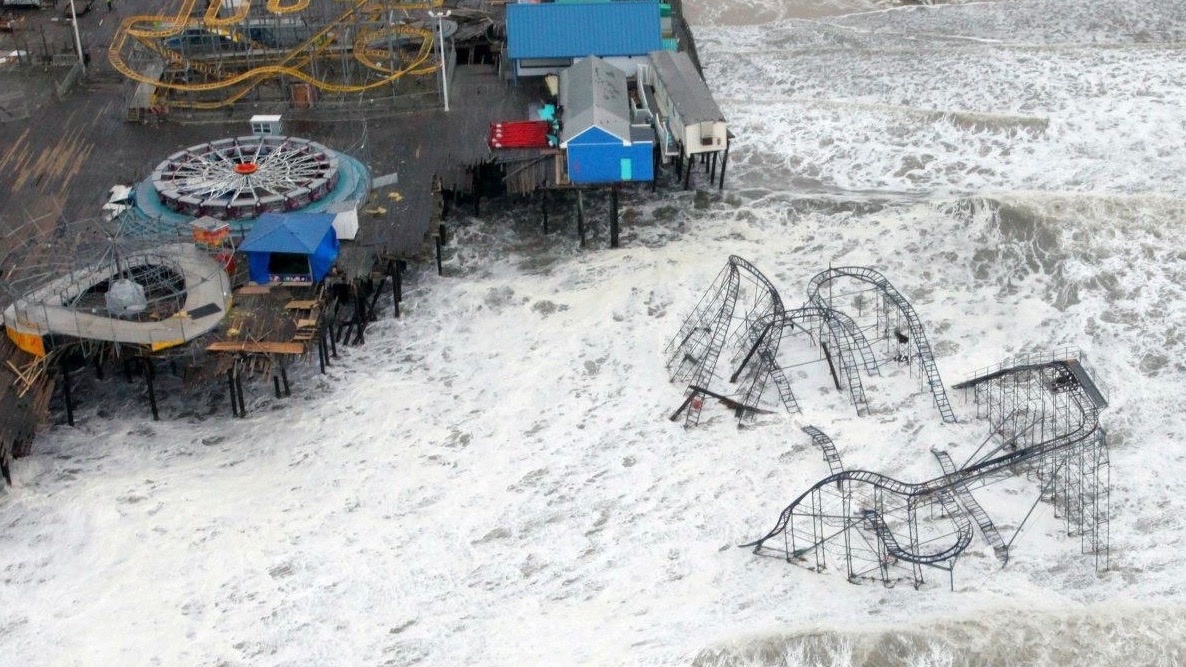
New Jersey Will Be First State to Require Building Permits to Consider the Climate Crisis

A roller coaster on the Jersey Shore flooded after Hurricane Sandy. Photo credit: Hurricane_Sandy_New_Jersey_Pier.jpg: Master Sgt. Mark C. Olsen / U.S. Air Force / New Jersey National Guard / CC BY 2.0
New Jersey will be the first state in the U.S. to require builders to take the climate crisis into consideration before seeking permission for a project.
Gov. Phil Murphy announced the new regulations Monday as part of the final version of the state’s master energy plan, which commits New Jersey to achieving 50 percent clean energy by 2030 and 100 percent by 2050, according to NJ Advance Media. But while The New York Times pointed out that other states have adopted a 2050 100 percent renewable energy goal, New Jersey will be the first to require that projects seeking Department of Environmental Protection (DEP) permits consider both how their projects’ emissions will contribute to global warming and how climate change will impact their building plans.
“This is a big deal,” director of the water and climate team at the Natural Resources Defense Council Rob Moore told The New York Times. “For New Jersey to step to the forefront and say, ‘We’re going to look at future climate impacts, and that it’s going to be a driver of our decision-making’ — that’s exactly what all 50 states need to be doing.”
Our Energy Master Plan will:
💡Drive a world-leading innovation economy
🌎Ensure environmental justice for all residents
💼Create good-paying jobs
🍃Protect our ecosystems
🏥Improve public health
✨Lead the way in the global clean energy transitionhttps://t.co/vfMZzlDlqc pic.twitter.com/xQYLffK4W1— Governor Phil Murphy (@GovMurphy) January 27, 2020
New Jersey has a particularly good reason to consider how climate might impact new construction projects. The state has 130 miles of coastline and is especially vulnerable to sea level rise. Murphy cited a Rutgers study that found that the state’s sea levels were projected to rise more than one foot by 2030 and two feet by 2050, NJ Advance Media explained.
“Quite frankly, it will be hard for future generations to create their Jersey Shore memories if the Jersey shore becomes only a memory,” Murphy said. “We are not gonna let this keep happening without a fight.”
To lead this fight, Murphy signed an executive order calling on DEP to craft the the Protecting Against Climate Threat (PACT) rules, the Daily Record reported. Those rules will include the requirement that the permitting process consider sea level rise and greenhouse gas emissions. PACT will also include new air pollution controls and compile a complete picture of New Jersey’s emissions so that it can reduce them to 80 percent below 2006 levels by 2050.
Murphy asked the DEP to have the new regulations finalized and ready to be implemented by January 2022, The New York Times explained.
However, some environmental groups criticized that timeline, saying it would allow more than a dozen new fossil fuel projects to slide in before that deadline, according to the Daily Record.
Empower NJ, a coalition of green groups, instead calls for a ban on all new fossil fuel projects.
“Without a moratorium on all new fossil fuel projects, we are losing precious time — time we don’t have to waste in the race against climate change,” Tracy Carluccio, deputy director of the Delaware Riverkeeper Network, told the Daily Record.
Green groups are also concerned that the 2050 clean energy goal calls for 100 percent “carbon neutral” energy. That means nuclear plants and offset natural gas can still be used.
“The (plan) still defines clean energy to include incinerators, natural gas, biogas and others,” Jeff Tittel, director of the New Jersey chapter of the Sierra Club, told NJ Advance Media. “It does not call for a moratorium on new fossil fuel projects or a 45% reduction of emissions by 2030, and will not get the state to zero carbon by 2050.”
However, other groups were pleased with the plan.
“Governor Murphy’s actions today put New Jersey at the forefront of efforts to reduce greenhouse gas emissions and build a healthier, more prosperous, clean energy future,” Tom Gilbert, campaign director of the New Jersey Conservation Foundation and ReThink Energy NJ, told the Daily Record.
- Record-Setting Harmful Algae Blooms in New Jersey's Largest Lake ...
- How Removing One Maine Dam 20 Years Ago Changed Everything ...
- Cheers to 2019 Energy Efficiency Progress - EcoWatch
- 5 Things to Know About Carbon-Free Buildings and Construction - EcoWatch

 233k
233k  41k
41k  Subscribe
Subscribe 